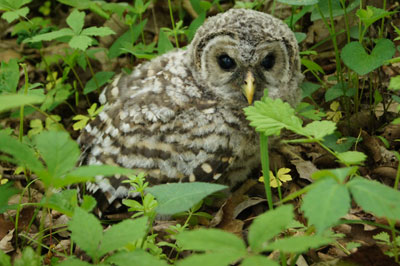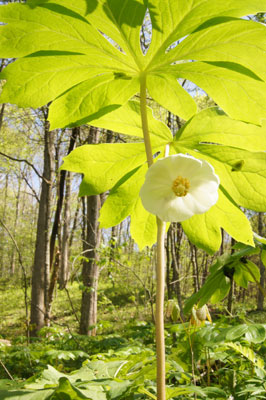Interacting with Nature during a Time of COVID-19 Concern
by Joanna Reuter
by Joanna Reuter
Spring is unfolding much as usual with the arrival of migrants, the blooming of wildflowers, and the chorus of frogs and toads. Yet the joys of spring are tempered this year by concerns about the coronavirus and what harm it will inflict on the human communities we cherish. The strong desire to want to be helpful runs up against the need to for individuals to physically isolate to “flatten the curve.”

April woods walks can bring lots of neat surprises. Eric & I encountered this fledgling Barred Owl during a walk in late April 2012.
We feel deep appreciation for those whose roles are essential and who are taking on more than their fair share of burden and risk to keep society running. For many of us, our most important contribution to society at present is to avoid risking becoming a burden on the medical system. As such, maintenance of physical and mental health should be high on our priority lists. I can’t imagine achieving either of those without interacting with and observing nature.
Here’s an unorganized list of guidance, ideas, inspiration, quotes, and miscellaneous random musings, mostly with links, and mostly relating to ways to interact with and learn about nature while the pandemic unfolds:
- “The Peace of Wild Things” a poem by Wendell Berry. Highly recommended.
- Columbia Parks and Rec guidance on stay-at-home order.
- Links compiled by the Cornell Lab for Ornithology; includes fun stuff like bird cams, identification resources, and more.
- Birds links for kids, compiled by Sarah Kendrick, MDC State Ornithologist.
- Feeding birds can provide a lot of joy. Songbird Station is selling bird food through curbside pickup, so support a CAS sponsor and keep your feeders full without the risk of entering a store. Songbird Station is also hosting “Facebook Live” presentations on Saturdays at 10 a.m.; see their website for more details.
-
Garden with native plants. The spring plant sales that were announced in the March issue of The Chat have been canceled. Sourcing plants direct from the nursery may still be an option, and this is a good way to support local businesses. Check their websites and/or make contact before showing up to find out the procedures for staying socially distanced while buying your plants. Here’s a listing of some nurseries that offer native plants:
- Nursery for the Hawthorn Chapter of the Native Plant Society, located near Ashland; email Becky Erickson for an appointment and directions, beckyerick711@centurylink.net
- Longfellow’s Garden Center: 573-584-9611
- Missouri Wildflowers Nursery: 573-496-3492; mowldflrs@socket.net
- Ozark Soul: 816-809-4062; natives@ozarksoul.com
- Prairie Hill Farm: 573-864-9597; sales@prairiehillfarm.biz
- SunRise Gardens
- Forrest Keeling Nursery: 800-356-2401
- Go take a hike. Be sure to check out the self-guided wildflower walk at Wild Haven. Or take a self-guided moss walk at Three Creeks Conservation area with this handout prepared by local moss enthusiast Louise Flenner, a member of CAS, Wild Ones, and the Native Plant Society; thanks Louise!
- “I personally feel that keeping up my mental health during this time is equally important to physical health….Yesterday I went to one of the trails in our nearby state park – Grasslands Trail, Rock Bridge Memorial Park. I took a leisurely 1.15 hour walk. What I noticed is that I spent more time really observing the birds, how they were behaving, etc. — because I had no time pressure, nowhere else to be, no other appointments, etc.” -Jean Leonatti on MOBIRDS-L (full message here)
- Take part in citizen science. Submit observations to eBird, iNaturalist, Journey North, and/or Nest Watch. These can provide a sense of purpose and community; they can contribute to science; and they can provide both motivation and a mechanism to learn more about the organisms around us.
- Sometimes, leave the screen behind. It’s great to take part in citizen science, but sometimes it’s nice to have a nature outing without a digital device. Do you observe birds differently when you’re not counting species and tallying individuals? Now and then, just go out and see what you see.
- With regard to the immune system: “[T]here are things we can manage, things that science shows us are powerful. The best examples are those over which we have complete control: sleep, exercise, meditation, and nutrition.” from An Elegant Defense by Matt Richtel (I just finished listening to this book, available from the Daniel Boone Regional Library for download via Overdrive, and I highly recommend it. )
- Take sustenance from nature: pick dandelions greens, chickweed, and other edible greens. Want to
control invasives at the same time? Then find a patch of garlic mustard for a nice mess of cooked greens. Greens are great for the gut microbes, and happy gut microbes are essential for health and well being. Obviously, you should only eat wild edibles that you can identify with certainty. And if harvesting beyond your yard, make sure regulations allow it, and consider other factors that might compromise their safety (residue of pesticides or dog doo, for example).
- Need I mention that morel season is coming? Talk about an outdoor activity with social distancing written all over it. Why go to the woods with just one purpose? Look for morels, see the wildflowers, and listen to the birds.
- Vitamin D is important for immune system function, and sun exposure is a great way to boost vitamin D levels; just be careful to avoid overdoing it, as sunburn isn’t healthy, either. Read more here and here.
- Plant a backyard vegetable garden. A year of growing annual crops can be a great way to prepare a spot for a longer term perennial native plant garden. And engaging in any kind of gardening is certain to give you opportunities to observe nature, whether it is examining critters in a shovel of soil or admiring hummingbirds visiting your food plants. The Columbia Center for Urban Agriculture is offering educational resources and arranging “Little Free Libraries” of seeds to help people grow food during the pandemic; more details in this letter and on the CCUA Facebook page.
- Try to learn to identify some new bird sounds this spring. Here’s an article from The Chat archives with resources for learning about bird song. If you hear something you don’t recognize, try making a recording. An app may be able to help (don’t ask me which one, I’m a curmudgeon on this topic), or you can share the recording with another human to ask for ideas. Feel free to email me with your mystery songs, contactus@cherthollowfarm.com.
- I enjoy observing nature on my own, but when I do I get a burning desire to tell other people about the things I’ve seen. Consider sharing your observations through Columbia Audubon Facebook, MOBIRDS listserv, and/or The Chat. I’d love to hear from you and publish your observations in the May issue; simply email me by April 25.
- Hone your birding skills online. For example, learn to do a better job estimating flock size (complete with quizzes where you can test yourself).
- “Department Of Interior Announces Birds Will Continue Going About Regular Bird Activities During Pandemic”, from The Onion (satire).
- Go off the beaten path. Eagle Bluffs and Rock Bridge are awesome, but they may get crowded at times. Less used public lands are out there. Have you ever been to Ashland Wildlife Research Area? Or Columbia Audubon Society’s Albert Children’s Wildlife Area (a name that refers to the Albert children, not one that implies it is optimal for children)? Or perhaps Earthquake Hollow Conservation Area? Try out MDC’s Place Finder for conservation areas and certain private lands or DNR’s online trail map for state parks. Also check out the Great Missouri Birding Trail and birding locations on the Missouri Birding Society (formerly Audubon Society of Missouri) website. Federal lands, including Mark Twain National Forest and Big Muddy National Fish & Wildlife Refuge often aren’t too crowded. Do consider hydrology before planning a trip to floodplain destinations, especially if the spring rains continue.
- When you do visit a new birding location, consider submitting a report about it to the National Audubon: Birdability initiative.
- Here are a few links with more advice on outdoor etiquette during the pandemic (thanks to Greenbelt Land Trust newsletter for sharing these):
- Use extra caution in general outdoors. Ticks are already active, so take appropriate measures to mitigate that risk. Be aware of the hazards of dead trees, especially on windy spring days with wet soil. Drive safely! And so forth.
Stay safe, stay sane, and stay in touch. We wish everyone well in these unusual times.



